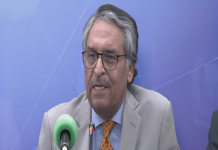Today marks the 70th anniversary of the black day when Pakistan’s first Prime Minister Liaquat Ali Khan was assassinated at the Rawalpindi park which now bears his name. It could be said that so soon after the death of the country’s founding father, Quaid-e-Azam Muhammad Ali Jinnah in 1948, Pakistan was not ready for such a tragedy. In many ways, the unnatural death of Khan was reflective of the national malaise Pakistan was it at that moment, just four years after independence from Great Britain. For one, the political class of the country had been thoroughly discredited following the failure of the war with India in Kashmir in 1948. Secondly, despite myriad promises, a constitution had still not been framed by the politicians which could elect a responsible group of politicians, including the majority in East Pakistan.
On the foreign policy front too, contrary to Khan’s claims about remaining non-aligned and making Pakistan a welfare state sworn to the ideals of ‘Islamic socialism’, Pakistan ignored the invitation of the Soviet Union to develop further ties and chose to become an ally of the United States, as evidenced by Khan’s state visit to the United States while he was Prime Minister. These problems eventually led to the first coup Pakistan’s history when a group of disgruntled, nationalist army officers tried to overthrow Khan’s government in February 1951.
Furthermore, what to talk of democracy in the country, Khan’s party, the Muslim League was still dominated by landlords which set an ugly precedent in stunting democracy in Pakistan’s nascent party-system for all times to come. These problems were still at a rudimentary stage when Khan was assassinated by an Afghan national Said Akbar on that afternoon of October 16, 1951; an unwelcome Afghan connection which still bears pondering in ‘Naya Pakistan’, as we contend with the continuing fallout of a Taliban government in neighbouring Afghanistan.
Khan’s assassination deprived Pakistan of an honest and selfless leader, which only exacerbated Pakistan’s problems in that it left a void which was filled by mediocre and self-serving politicians whose shenanigans only gave more power and excuse to the army and the civil-military bureaucracy to repeatedly intervene in the running of power, something which continues to this day as I write this. So much so that the country’s greatest writer Saadat Hasan Manto was moved to pen the following excoriating lines on the national tragedy in a long piece written just a week after the assassination: “Man: Enemy of man. Party: Enemy of Party. Government: In conflict with government. This is the story of the 20th century, as it was the story of the 1st century. Like other goods and commodities on sale, human flesh has also always been on sale”
Written by Raza Naeem| Lahore





